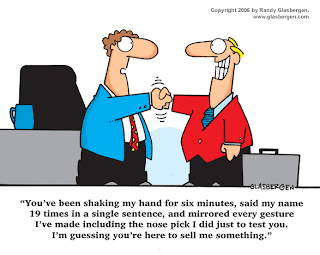Q: In competitive sales, sometimes work ethics take a backseat... you are compelled to do "certain" things. Would love to hear ur view on this.
Kaleem, UAE
A: What a great question Kaleem, thank you.
Just by having to ask the question may indicate that you are not comfortable with the "certain" things you are being compelled to do or address with your prospects or customers.
Wouldn't I love to sit in on your sales calls to understand the hidden message or what you are being asked to do to make a sale. I joked with one of my favorite managers once, as a woman, that I would fall short of prostitution to get a sale. It was always good for a chuckle because he was male and also thought that was funny, adding that I was one of the few that didn't need to.
While I can certainly empathize with your question, you most likely have your answer. If you have to ask yourself the question, never mind someone else, chances are your instinct is telling you it stinks.
I speak from experience in the past 24 hours, I hit a landmark sale, up 1300% year over year in this particular segment. To emphasize this discussion, while we were doing the paperwork I asked this customer if they got freebies based on their position. The answer was no. It was a fair sale, there was more negotiation than I would have liked (every sales pro prefers a smooth close) but because it was also big, there had to be some give and take from both sides to "seal the deal".
I share this because it is that old saying: people buy from people. Remember how they say that you tend to be attracted to a lifemate that represents the gender of the parent they represent? It is my firm belief that people tend to buy from people or organizations that they share similar cultural and core values.
At the beginning of each day, before you even put your sunny sales game face on, it is you and the mirror. Ask yourself what limit those "certain things" are. Granted it is easier to have your organization set those limits for you. That way, you can blame your boss or company policy. Each and every time you sit before a customer, you should have a clear understanding of what your own personal limits are to make a sale.
I've had organizations that I've sold for that encourage this and that. However, it is myself that decides which limits I will engage. I'm a decent golfer, so I've done that ... but only after a relationship has been established aka a sale. The best piece of advice I ever received in this corner was "spend their money" .. don't spend "our" money to win them.
 Call me seasoned, but I know that my biggest and best customers have high integrity and wouldn't expect me to compromise my values because they see the value in what I offer. I won't share information, other than generic, on competitors I work with to each other. Often, if I'm asked a point blank question, I will simply state that if the tables were turned, they'd appreciate I uphold their own confidentiality. You will find that this builds trust. Trust is the number one attribute buys want from their sales representative, miles ahead of product knowledge. I stand behind the belief that the best customers in the long run, and end up being the biggest sales, are from the ones that don't compromise my honesty or integrity. I want to look at each great customer square in the eye, like I do in the mirror every morning, and not blink.
Call me seasoned, but I know that my biggest and best customers have high integrity and wouldn't expect me to compromise my values because they see the value in what I offer. I won't share information, other than generic, on competitors I work with to each other. Often, if I'm asked a point blank question, I will simply state that if the tables were turned, they'd appreciate I uphold their own confidentiality. You will find that this builds trust. Trust is the number one attribute buys want from their sales representative, miles ahead of product knowledge. I stand behind the belief that the best customers in the long run, and end up being the biggest sales, are from the ones that don't compromise my honesty or integrity. I want to look at each great customer square in the eye, like I do in the mirror every morning, and not blink.
Those same customers that make unreasonable demands are telling you something. There is a reason for it. Your job is to ask a ton more questions to figure out what it is. Some cultures perhaps will only feel satisfied if they've bartered. However, those that are savvy, appreciate all the hard work you've put behind presenting a propsal that appears to fit like a glove to their needs. They'll forget about the bargaining because they'll want a sales pro that understands their business more.
The customers that don't operate that way, enjoy toying with you until the next victim (er, sales pro) comes along. Chances are they don't see the value in what you are offering, only in the fun in the bargaining or toying. It tends to signal to me that I'm not dealing with the decision maker. Some can smell a new sales rep a mile away. That sales rep may not be new to sales, just new to them or to the organization they are representing. They are going to test how far they can push. If you have to give in, it could be a free lunch or tickets to a football game. Be sure you use that to your advantage to get as much information out of them because chances are their guard is down, you're in a social setting. Turn it around and put it to good use ~ ask more questions for goodness sake!
For the past 10-15 years, any organization I've worked for has had me sign Code of Ethics and Confidentiality Agreements. That isn't surprising because I work for organizations that take their own core values seriously. If you work for an organization that compromises your values, and wants you to win at all costs, it may not be the best fit. The one executive I did work that who disguised shrewd business savvy with unscrupilous business practice, causing me to move on, does not maintain the relationships I still have long after those contacts ceased to be clients.
I will repeat myself .. based on my own experience. My biggest sales and best customers are those that recognize a win/win relationship, compromise when there are hurdles, and actively participate in resolving issues. After all, you worked hard to address their business needs, you want them to succeed, they're your cheerleader, in your corner, rooting you on.
Try not to become a man of success but rather try to become a man of value.
~Albert Einstein
Hope this helps somewhat Kaleem .... I wish you well, JM
***
Do you have a sales situation or business question that you'd like to ask? Drop me a note under comments and I will do my best to answer. Until then, Happy Selling!









